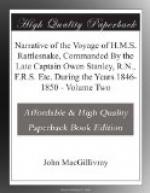While landing our things at the other side of the river, the natives assembled in great numbers about our luggage. As they appeared to be friendly, we permitted them to come within about 150 yards of our landing-place; with some few we had a little difficulty, but for the most part they would sit down quietly as soon as a sign was made for them to do so.
June 6.
Early this morning Lieutenant Simpson of the Rattlesnake left us, he having stayed all night at the camp, and we were now left entirely to our own resources. We loaded our carts and packhorses, and proceeded about three miles inland, but again finding it impossible to cross the swamps, we returned to the beach, and about dusk came to another river, also emptying itself into Rockingham Bay, about two miles south-west of the first we had to cross. This river was much wider than the first, being about two hundred yards wide where we crossed it near the mouth. At the mouth of this river is a sandbank, over which the water is about four feet deep. Inside the bank the water is ten feet deep. The tide flows up for about a mile; there appears to be a great quantity of fresh water discharged into the sea from the river, which, I think, is principally supplied from the swamps. These swamps lie at the foot of a high mountain range, and probably the rivulets descending from the range spread over the flat ground, and form channels by which they reach the sea. Fresh water can be obtained on either side the river very near the sea. I tasted fresh water on one side, salt in the middle, and slightly brackish on the other side, as we crossed over it. Small boats only can enter this river, on account of the sandbank at the mouth. Its course turned to the south-west about two miles up. Its banks were sandy and barren, at least close to the water; on the north side of the river there is a mangrove swamp, extending some distance up the stream; on the south side the banks are higher, and are covered with Casuarinas and Acacias, the soil being sandy and pretty well covered with grass, the land slightly undulating, for about one and a half or two miles up the river. It being too late to think of crossing the river to-night, we hobbled our horses, and having pitched Mr. Kennedy’s tent, slept on the sand till morning.
June 7.
As soon as we had breakfasted this morning, we prepared to cross, to assist us in which undertaking we contrived to construct a sort of punt by taking the wheels and axletrees off one of the carts. We then placed the body of the cart on a large tarpaulin, the shafts passing through holes cut for them, the tarpaulin tightly nailed round them. The tarpaulin was then turned up all round, and nailed inside the cart; by this means it was made almost water-tight. We then fastened our water-bags, filled with air, to the sides of the cart, six on each side, and a small empty keg to each shaft. We tied our tether ropes together, and made one end fast on each side of the river, by which means our punt was easily pulled from one side to the other. By this contrivance we managed to get most of our things over during the day, and at night a party slept on either side, without pitching the tents.




